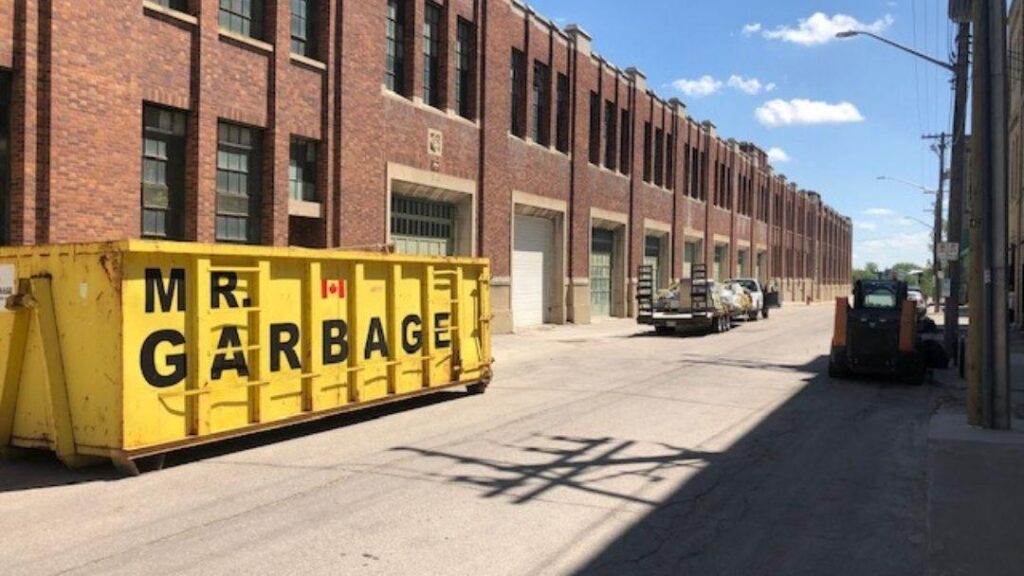Clearing an office, whether you’re a small business moving locations, an estate executor handling a former home office, or a property manager prepping a commercial suite, creates a special set of challenges. Office furniture and electronics are bulky, sensitive items that may require documented disposal, and businesses must stay compliant with municipal and provincial rules.
This guide explains everything Winnipeg property owners and managers need to know about
office cleanout and junk removal: when to hire professionals, how the process works, local disposal pathways, environmental best practice, and how Mr. Garbage supports smooth, responsible clear-outs across Winnipeg. Short, practical sections make this easy to scan and use while you plan the job.
What is office cleanout and junk removal?
Office cleanout and junk removal is a specialized service that removes furniture, IT equipment, cabinetry, shelving, packing materials, and other commercial waste from workplaces.
Key elements include:
- on-site assessment and written quoting,
- triage for reuse, donation, and recycling,
- safe removal of bulky and heavy office pieces,
- handling of electronics and confidential materials, and
- delivery of disposal documentation for records.
Professional teams coordinate logistics so your office can reopen or be put on the market quickly and legally.
When you need office cleanout and junk removal
Businesses and property owners commonly call for office cleanouts in these situations:
- office moves or downsizing,
- lease terminations and tenant turnovers,
- estate or probate situations involving home offices,
- renovations and retrofit projects, and
- post-event or landlord-directed clear-outs.
If you’re under a tight timeline, for example, a landlord requires the space cleared before a new tenant moves in, a professional provider with documented processes is the fastest, safest path.
Office Cleanout and Junk Removal: What Professionals Do
A professional office cleanout usually follows these steps.
Assessment & scope
A crew or estimator visits the site (or reviews photos) and documents the volume and types of items. They identify electronics, confidential material, and items suitable for donation or reuse.
Sorting & diversion
Teams separate items into donation, recycling, and disposal streams. Usable furniture and office supplies can often be routed to local charities or resale outlets.
Secure removal & transport
Crews handle disassembly, stair carries, elevator logistics, and safe loading. IT equipment may be boxed and secured for recycling or data destruction.
Documentation & receipts
After removal, reputable companies provide donation receipts and disposal documentation (weight tickets or manifests) for accounting, tax, or legal records.
These practices reduce liability and create a clear paper trail for property owners and executors.
Why hire professionals for office cleanout and junk removal?
Hiring a professional saves time and reduces risk.
- Speed: experienced crews remove items faster than volunteers or staff.
- Safety: teams use proper lifting equipment and techniques for bulky items.
- Compliance: professionals know where to route electronics and hazardous materials.
- Accountability: disposal receipts and donation records help with audits and estate accounting.
For Winnipeg businesses, a local provider also brings practical knowledge about municipal drop-off options and routes to the Brady Road Resource Management Facility, an important part of the city’s waste infrastructure.
City of WinnipegLocal disposal pathways in Winnipeg
Winnipeg offers a network of options for reused and recycled materials. Knowing these local pathways helps your cleanout be greener and more cost-effective.
Donation partners
Many charities accept office furniture and supplies when items are in reusable condition. Routing serviceable desks, chairs, and shelving to charity extends their life and benefits community programs.
E-waste and batteries
Electronics and batteries are handled through designated e-waste streams. Winnipeg’s 4R depots accept many household electronics and batteries; commercial e-waste often requires a licensed processor. Professionals will route IT equipment to approved processors to prevent hazardous materials from entering the landfill.
Municipal processing: Brady Road
Large volumes and mixed loads commonly go to Winnipeg’s central facility, which manages disposal operations and diversion programs. Proven haulers deliver to Brady Road and provide weight tickets or manifests as proof of proper disposal.
City of WinnipegUsing a provider familiar with these routes reduces the chance of rejected loads and ensures proper environmental handling.
Environmental context: why diversion matters
Canada and Manitoba track diversion to improve sustainability. Recent federal indicators show diversion remains a national priority and informs municipal programs. Choosing donation and recycling routes during an office cleanout supports these goals and reduces landfill impact.
Government of Canada Statistics CanadaFor Winnipeg specifically, diverting furniture, metals, and electronics through the right channels helps the city reduce landfill tonnage and supports local reuse economies. When planning a cleanout, ask your provider how they prioritize reuse and recycling.
Securing confidential materials during an office cleanout
Protecting sensitive data is a business-critical part of any office cleanout.
Identify confidential material
Before removal, list files, hard drives, and devices that may contain personal or corporate data. Mark boxes clearly.
Chain of custody
Use providers who offer chain-of-custody procedures and documented handling for sensitive items. For IT equipment, certified data destruction (onsite wiping or offsite certified destruction) is often the right approach.
Certificates of destruction
Ask for certificates for hard drive destruction or secure shredding. These records are useful for compliance and to protect your organization from future liability.
Mr. Garbage coordinates with certified e-waste and data-destruction partners to offer secure options when needed.
Preparing your office for a cleanout
Good preparation shortens the job and lowers risk.
- Inventory & photos: create a room-by-room list and take photos for quoting and records.
- Label confidential areas: mark rooms or items that need secure handling.
- Assign a point person: one contact reduces confusion and speeds decisions on donations vs. disposal.
- Clear access: move vehicles and ensure elevators are available for large furniture.
- Separate donation items: set aside usable furniture and supplies to speed donation routing.
A short prep checklist makes the whole process smoother for crews and managers alike.
Common items handled in office cleanouts
Office cleanouts commonly include:
- desks, chairs, and cubicle panels,
- filing cabinets and shelving,
- office equipment (printers, copiers, fridges),
- electronics (monitors, servers, computers),
- carpets, ceiling tiles, and light fixtures, and
- packing materials and general bulk waste.
Some items, notably refrigerant-containing appliances, certain lighting with mercury, and regulated hazardous products, require special handling and separate notification.
Handling regulated materials & hazardous items
Some office cleanout waste is regulated and needs licensed treatment.
- Refrigerants: appliances with refrigerants (fridges, some A/V equipment) require certified decommissioning.
- Mercury-containing items: older fluorescent lighting and thermostats must be handled by approved processors.
- Hazardous chemicals: solvents, oils, and specialized lab materials require licensed hazardous-waste routes.
A professional cleanout provider will identify these items during assessment and either exclude them from general loads or arrange specialized disposal.
Real-world example: corporate office move in Winnipeg
A mid-sized company relocating across town needed a full floor cleared quickly.
- Scope: 50 desks, 120 chairs, several server racks, and miscellaneous electronics.
- Approach: The provider performed a pre-move assessment, scheduled an evening slot to avoid business interruption, and coordinated an IT team for secure server handling.
- Outcome: usable furniture was donated to a local non-profit, electronics were sent to certified e-waste processors, and the landlord received disposal documentation and weight tickets.
This kind of planning reduces downtime and creates traceable records for asset disposition — a practical model for any business move.
Why pick a local provider like Mr. Garbage
Local experience matters.
- Winnipeg knowledge: drivers know municipal access constraints, loading zones, and best routes to local depots.
- Donation networks: local partners ensure furniture placed for reuse reaches community organizations.
- Documented disposal: local haulers deliver records from city facilities like Brady Road and from accredited recyclers.
- Responsive scheduling: local crews can often meet tight timelines for tenant turnovers or estate-driven clearouts.
Mr. Garbage provides tailored office cleanout services with a local focus, coordinating donation routing, secure electronics handling, and disposal documentation to meet business needs.
Safety, insurance, and labour considerations
Large office items and tight spaces increase risk.
- Trained crews: choose providers whose crews are trained in safe lifting and proper equipment use.
- Insurance: Confirm the provider carries liability insurance that covers accidental damage during removal.
- Specialised lifts: ask about stair-climbing dollies or skid-steer options for particularly heavy or awkward loads.
A professional team reduces injury risk and protects your property during removal.
How documentation protects your organization
Documentation is more than paperwork; it’s protection.
- Donation receipts document charitable contributions or transfers of ownership.
- Weight tickets and manifests prove where waste was delivered and how it was handled.
- Certificates of destruction for data-bearing devices show compliant data disposition.
Collecting and storing these documents is essential for audits, estate accounting, tax records, and landlord disputes.
Choosing the right office cleanout and junk removal partner
Ask potential providers about:
- Local experience and references in Winnipeg, especially with commercial cleanouts.
- Processes for donations, recycling, and e-waste handling.
- Data security options and certificates for electronics disposal.
- Insurance and worker training.
- What documentation will be supplied after job completion.
A short phone call that asks these questions separates professional, trustworthy operators from the rest.
Expert perspective
“Commercial cleanouts succeed when logistics are planned like a small project,” says Maya Roberts, Corporate Facilities Consultant. “Coordination — scheduling elevators, documenting data destruction, and lining up donation pickups- makes the difference between a clean sweep and a chaotic day. Local providers who do this well save companies real time and legal headaches.”
This practical viewpoint reflects best practices in facilities management.
Frequently Asked Questions (FAQs)
Q1: What is included in office cleanout and junk removal services?
A1: Services typically include assessment, sorting for donation and recycling, safe removal of furniture and electronics, coordination of special handling for hazardous items, and delivery of documentation such as donation receipts and disposal weight tickets.
Q2: Can you dispose of old computers and servers securely?
A2: Yes, reputable providers work with certified e-waste processors and can arrange secure data destruction or provide certificates of destruction for hard drives and other storage media.
Q3: Do you take large office furniture and cubicle systems?
A3: Yes, experienced crews can disassemble modular systems and remove large furniture pieces safely, including stair carries and elevator coordination when necessary.
Q4: How quickly can an office cleanout be completed?
A4: Timelines vary by size and complexity. Small offices can often be cleared in a day; larger floors may require phased removals. Providers with local crews and good planning can often meet tight tenant-turnover windows.
Q5: Will you donate usable office furniture?
A5: Many providers coordinate donations to local charities or social enterprises when furniture is in good condition and accepted by partners. Donation receipts can be provided for estate or accounting needs.
Conclusion
Office cleanouts and commercial junk removal are logistical and regulatory tasks that are best handled by experienced local teams. For Winnipeg property owners and managers, choosing a provider that understands local disposal pathways, secures confidential materials properly, and provides clear documentation is essential.
Mr. Garbage offers office cleanout and junk removal services across Winnipeg, combining on-site assessment, donation and recycling routing, secure electronics handling, and documented disposal. If you’re planning a move, tenant turnover, or an estate-related cleanout, call Mr. Garbage to schedule an assessment and get a clear, managed plan for getting the job done quickly and responsibly. Visit mrgarbage.ca or call us (204) 999-5865 to book a consultation.

